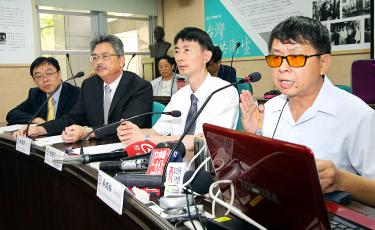Several National Taiwan University professors yesterday criticized the government’s efforts to crack down on food safety violations, saying that the snowballing recycled waste oil scandal highlights a lack of inter-ministerial cooperation and the ineffectiveness of the food safety management system.
Their remarks came one day after the Food and Drug Administration (FDA) released the results of laboratory tests that found the edible lard oil manufactured by Greater Kaohsiung-based Chang Guann Co (強冠企業), which included recycled waste oil collected from restaurant fryers, met legal standards.
“The oil scandal pertains to three ministries: the Ministry of Economic Affairs, which governs factory registration; the Environmental Protection Administration [EPA], which regulates ordinary business waste such as waste cooking oil; and the Ministry of Health and Welfare, which manages edible oil products,” Institute of Environmental Health professor Chen Chia-yang (陳家揚) told a news conference in Taipei.
Restaurants that produce waste cooking oil are legally required to inform the EPA about the firms they hire to recycle their oil and the amount that is taken away on each trip, while the recycling companies must submit records on the types and quantity of oil they handle to the economic affairs ministry.
Chang Guann allegedly used waste oil provided by Kuo Lieh-cheng (郭烈成), the owner of an unlicensed factory in Pingtung County, who is believed to have purchased the oil from waste recycler Hu Hsin-te (胡信德), Chen said.
“If the EPA and Ministry of Economic Affairs had cross-checked their records, they should have had no trouble spotting companies that sold or purchased abnormal amounts of the waste oil,” Chen said.
Reducing risks to food safety is not just a job for the FDA, it requires a concerted effort by all relevant government agencies, Chen said.
Wu Kuen-yuh (吳焜裕), a professor at the Institute of Occupational Medicine and Industrial Hygiene, said the reason the FDA’s standard lab tests have detected so few problems in the current and previous food scandals is because the government only regulates 800 kinds of food additives and chemicals when there are more than 70,000 being used nationwide.
“In addition, the failure of police investigators to notify the FDA and local health departments the minute they discovered the [alleged] illegal sales of waste cooking oil and the decision to wait four months to do so underlines the lack of cooperation and coordination between agencies,” Wu said.
College of Public Health dean Chen Wei-jen (陳為堅) said that if the government is serious about eliminating illegal practices in the food industry, it should increase the number of random, unannounced inspections of food manufacturers, rather than relying on the companies’ self-monitoring.
Source: Taipei Times - 2014/09/10





















